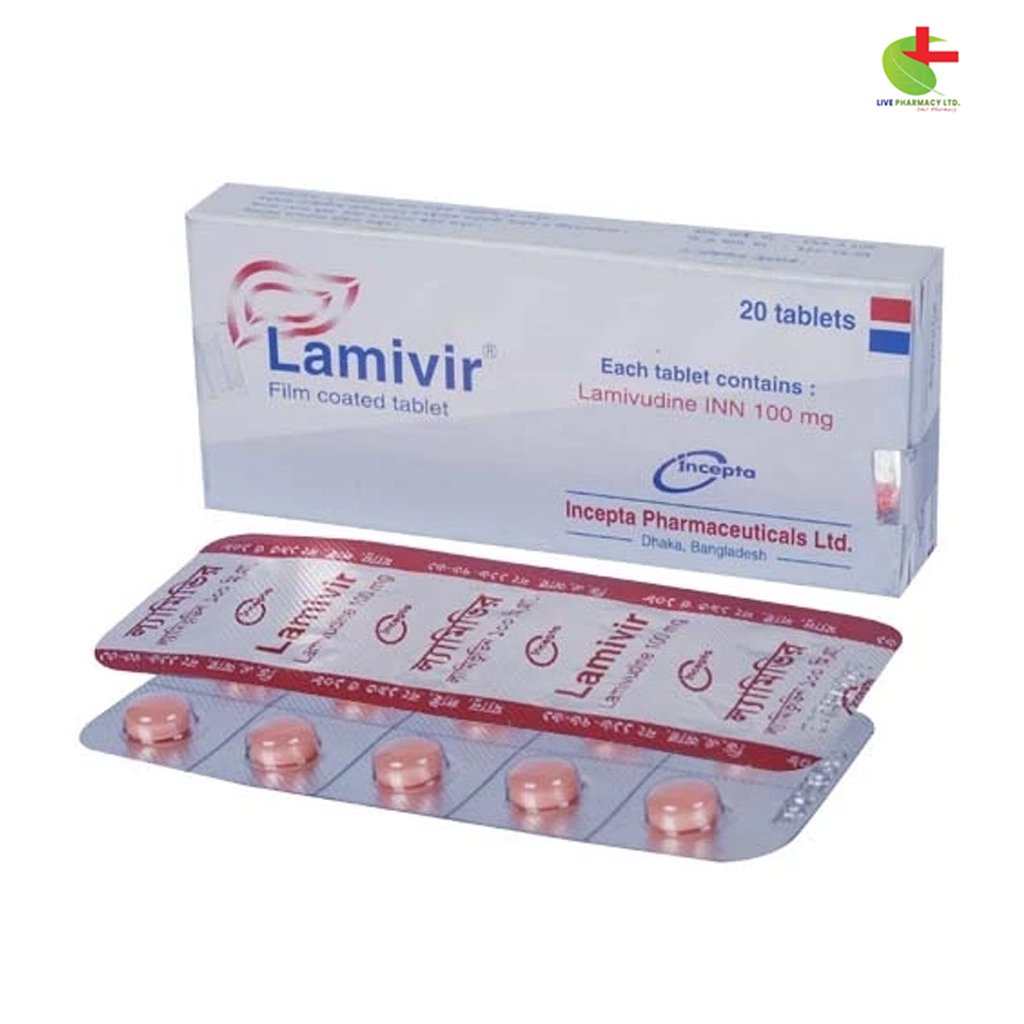Lamivir 100
250.00৳ Strip
- Lamivir is an antiviral medication for chronic hepatitis B treatment, targeting viral replication and liver inflammation.
- It functions as a synthetic nucleoside analogue, disrupting viral DNA synthesis.
- The recommended dosage for adults is 100 mg once daily.
- Patients should consult healthcare professionals for guidance and regular monitoring during treatment.
- Proper storage conditions are essential to maintain the medication’s efficacy.
 Brand
Brand
|
Incepta Pharmaceuticals Ltd |
|---|---|
 Generics
Generics
|
Lamivudine [For Chronic Hepatitis B] |
 Type
Type
|
Tablet |
Indications
Lamivir is prescribed for the management of chronic hepatitis B, specifically when there is evidence of viral replication and active liver inflammation.
Always consult a registered healthcare professional before using this medication.
Pharmacology
Lamivudine functions as a synthetic nucleoside analogue. Inside cells, it is converted into lamivudine triphosphate. This active form gets integrated into the viral DNA by the hepatitis B virus (HBV) polymerase, leading to the termination of the DNA chain. Additionally, lamivudine triphosphate inhibits the RNA and DNA-dependent DNA polymerase activities of HIV-1 reverse transcriptase (RT), although it has minimal inhibitory effects on mammalian alpha, beta, and gamma-DNA polymerases.
Dosage & Administration
For adults with chronic hepatitis B, the recommended oral dosage of Lamivudine is 100 mg once daily.
Always seek advice from a registered healthcare professional prior to use.
Interactions
The combination of Trimethoprim (160 mg) and Sulfamethoxazole (800 mg) taken once daily has been observed to increase the exposure levels of Lamivir (AUC). The impact of higher doses of this combination on Lamivir’s pharmacokinetics remains unexamined.
Contraindications
Lamivudine is not suitable for individuals who are hypersensitive to any ingredient in the formulation.
Side Effects
Lamivir may lead to several serious adverse reactions, including lactic acidosis, severe hepatomegaly with steatosis, post-treatment exacerbations of hepatitis B, pancreatitis, and the emergence of viral mutants that show reduced susceptibility to the medication. Common side effects include malaise, fatigue, fever, ENT infections, sore throat, nausea, vomiting, abdominal pain, diarrhea, myalgia, arthralgia, headaches, and skin rashes. Reports of lactic acidosis and severe hepatomegaly with steatosis have also occurred.
Pregnancy & Lactation
Currently, there is insufficient data from well-controlled studies in pregnant women. Lamivudine should only be considered during pregnancy if the potential benefits justify the risks. The excretion of lamivudine in human milk is unknown; hence, breastfeeding is discouraged for mothers receiving this medication.
Precautions & Warnings
Prior to initiating treatment with Lamivir, and throughout its use, patients should be evaluated by a physician experienced in managing chronic hepatitis B.
Use in Special Populations
Dosages of Lamivir should be tailored based on renal function. Recommended dosage adjustments based on creatinine clearance (CrCl) are as follows:
- CrCl 50 ml/min: 100 mg once daily
- CrCl 30-49 ml/min: 100 mg for the first dose, then 50 mg once daily
- CrCl 15-29 ml/min: 100 mg for the first dose, then 25 mg once daily
- CrCl 5-14 ml/min: 35 mg for the first dose, then 15 mg once daily
- CrCl <5 ml/min: 35 mg for the first dose, then 10 mg once daily
Use in Children:
The safety and efficacy of Lamivir in treating chronic hepatitis B in pediatric patients have not been established.
Therapeutic Class
Hepatic viral infections (Hepatitis B)
Storage Conditions
Store at temperatures below 30°C, away from light and moisture. Keep out of reach of children.













Reviews
There are no reviews yet.